English Lesson Plan: Sociocultural Theory, CCSS Standards and ELD
VerifiedAdded on 2022/08/29
|9
|1571
|34
Homework Assignment
AI Summary
This assignment presents a detailed English lesson plan designed for language learners, focusing on the application of sociocultural theory. The lesson plan aligns with the California Common Core State Standards (CCSS) and English Language Development (ELD) standards. It includes a rationale explaining the theoretical basis, performance objectives focusing on vocabulary and comprehension, and a comprehensive lesson sequence. The plan incorporates various activities such as activating schemata, text interpretation, sociocultural interpretation, presentation, and debriefing. Assessment methods are aligned with CCSS, utilizing diverse tools for evaluating student progress. The assignment also highlights the importance of oral components in language development and includes a reference list of relevant academic sources. The lesson plan emphasizes the importance of a student's surrounding environment and world to facilitate language acquisition. The lesson plan is designed to enhance the English language proficiency of students at various stages of development.
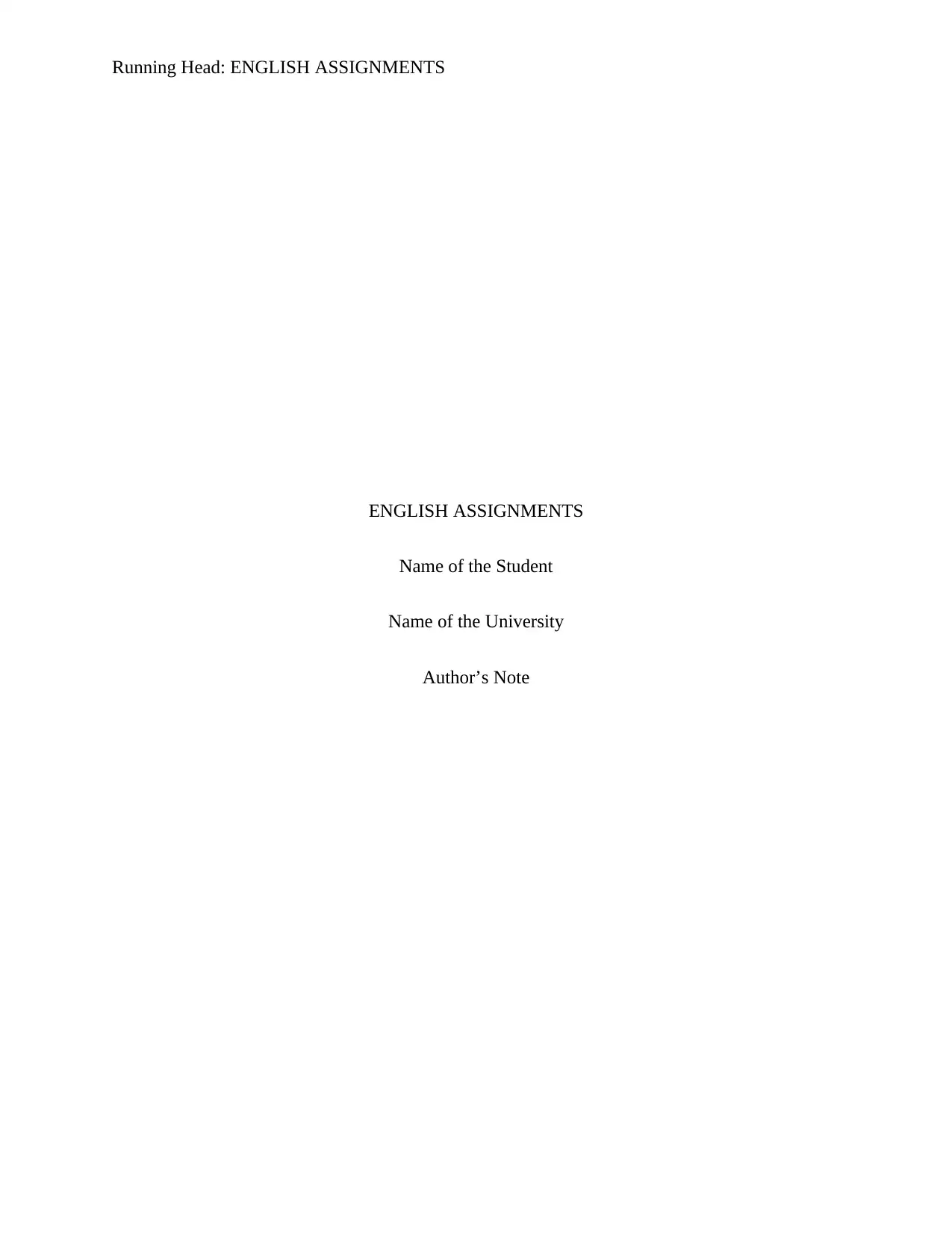
Running Head: ENGLISH ASSIGNMENTS
ENGLISH ASSIGNMENTS
Name of the Student
Name of the University
Author’s Note
ENGLISH ASSIGNMENTS
Name of the Student
Name of the University
Author’s Note
Paraphrase This Document
Need a fresh take? Get an instant paraphrase of this document with our AI Paraphraser
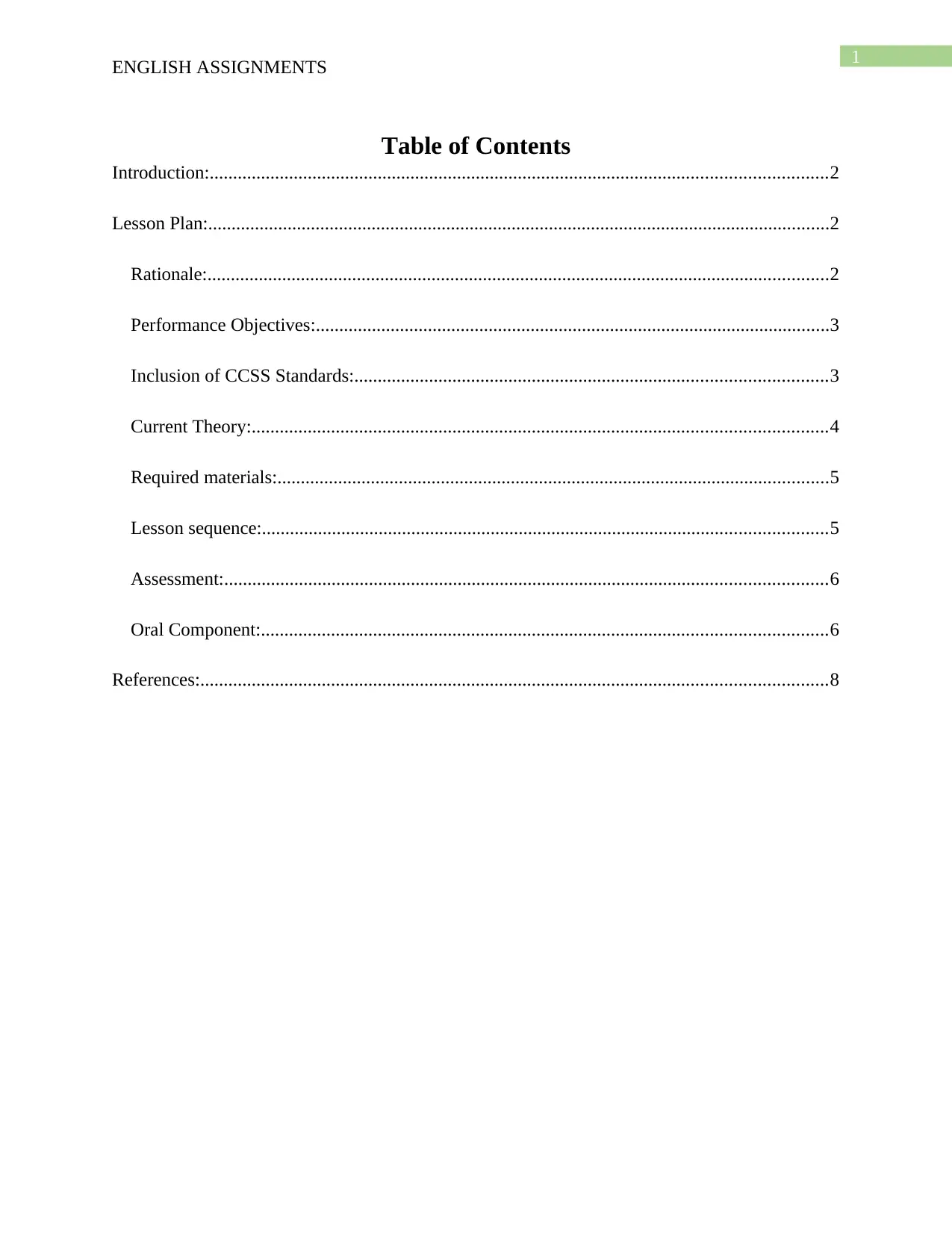
1
ENGLISH ASSIGNMENTS
Table of Contents
Introduction:....................................................................................................................................2
Lesson Plan:.....................................................................................................................................2
Rationale:.....................................................................................................................................2
Performance Objectives:..............................................................................................................3
Inclusion of CCSS Standards:.....................................................................................................3
Current Theory:...........................................................................................................................4
Required materials:......................................................................................................................5
Lesson sequence:.........................................................................................................................5
Assessment:.................................................................................................................................6
Oral Component:.........................................................................................................................6
References:......................................................................................................................................8
ENGLISH ASSIGNMENTS
Table of Contents
Introduction:....................................................................................................................................2
Lesson Plan:.....................................................................................................................................2
Rationale:.....................................................................................................................................2
Performance Objectives:..............................................................................................................3
Inclusion of CCSS Standards:.....................................................................................................3
Current Theory:...........................................................................................................................4
Required materials:......................................................................................................................5
Lesson sequence:.........................................................................................................................5
Assessment:.................................................................................................................................6
Oral Component:.........................................................................................................................6
References:......................................................................................................................................8
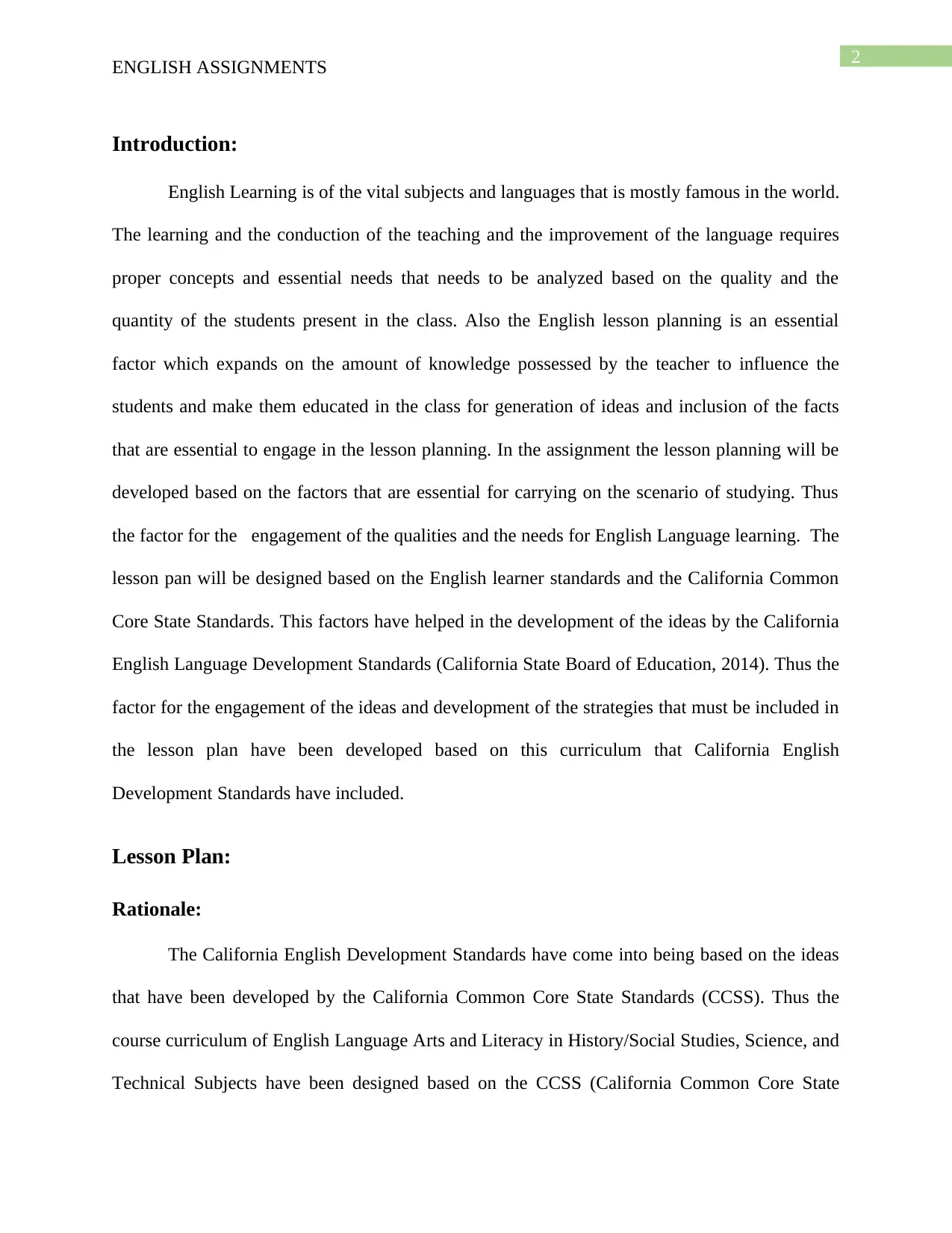
2
ENGLISH ASSIGNMENTS
Introduction:
English Learning is of the vital subjects and languages that is mostly famous in the world.
The learning and the conduction of the teaching and the improvement of the language requires
proper concepts and essential needs that needs to be analyzed based on the quality and the
quantity of the students present in the class. Also the English lesson planning is an essential
factor which expands on the amount of knowledge possessed by the teacher to influence the
students and make them educated in the class for generation of ideas and inclusion of the facts
that are essential to engage in the lesson planning. In the assignment the lesson planning will be
developed based on the factors that are essential for carrying on the scenario of studying. Thus
the factor for the engagement of the qualities and the needs for English Language learning. The
lesson pan will be designed based on the English learner standards and the California Common
Core State Standards. This factors have helped in the development of the ideas by the California
English Language Development Standards (California State Board of Education, 2014). Thus the
factor for the engagement of the ideas and development of the strategies that must be included in
the lesson plan have been developed based on this curriculum that California English
Development Standards have included.
Lesson Plan:
Rationale:
The California English Development Standards have come into being based on the ideas
that have been developed by the California Common Core State Standards (CCSS). Thus the
course curriculum of English Language Arts and Literacy in History/Social Studies, Science, and
Technical Subjects have been designed based on the CCSS (California Common Core State
ENGLISH ASSIGNMENTS
Introduction:
English Learning is of the vital subjects and languages that is mostly famous in the world.
The learning and the conduction of the teaching and the improvement of the language requires
proper concepts and essential needs that needs to be analyzed based on the quality and the
quantity of the students present in the class. Also the English lesson planning is an essential
factor which expands on the amount of knowledge possessed by the teacher to influence the
students and make them educated in the class for generation of ideas and inclusion of the facts
that are essential to engage in the lesson planning. In the assignment the lesson planning will be
developed based on the factors that are essential for carrying on the scenario of studying. Thus
the factor for the engagement of the qualities and the needs for English Language learning. The
lesson pan will be designed based on the English learner standards and the California Common
Core State Standards. This factors have helped in the development of the ideas by the California
English Language Development Standards (California State Board of Education, 2014). Thus the
factor for the engagement of the ideas and development of the strategies that must be included in
the lesson plan have been developed based on this curriculum that California English
Development Standards have included.
Lesson Plan:
Rationale:
The California English Development Standards have come into being based on the ideas
that have been developed by the California Common Core State Standards (CCSS). Thus the
course curriculum of English Language Arts and Literacy in History/Social Studies, Science, and
Technical Subjects have been designed based on the CCSS (California Common Core State
⊘ This is a preview!⊘
Do you want full access?
Subscribe today to unlock all pages.

Trusted by 1+ million students worldwide
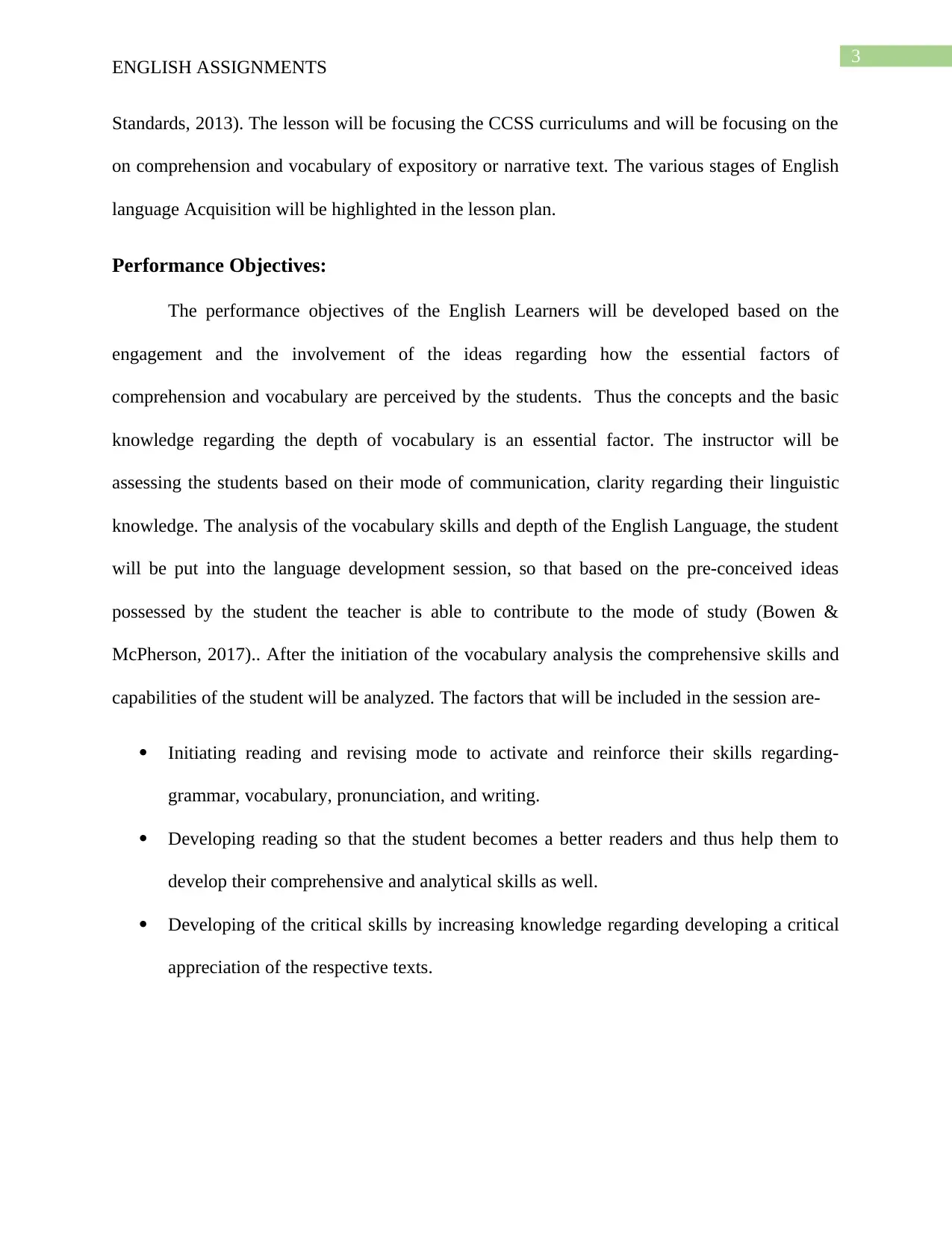
3
ENGLISH ASSIGNMENTS
Standards, 2013). The lesson will be focusing the CCSS curriculums and will be focusing on the
on comprehension and vocabulary of expository or narrative text. The various stages of English
language Acquisition will be highlighted in the lesson plan.
Performance Objectives:
The performance objectives of the English Learners will be developed based on the
engagement and the involvement of the ideas regarding how the essential factors of
comprehension and vocabulary are perceived by the students. Thus the concepts and the basic
knowledge regarding the depth of vocabulary is an essential factor. The instructor will be
assessing the students based on their mode of communication, clarity regarding their linguistic
knowledge. The analysis of the vocabulary skills and depth of the English Language, the student
will be put into the language development session, so that based on the pre-conceived ideas
possessed by the student the teacher is able to contribute to the mode of study (Bowen &
McPherson, 2017).. After the initiation of the vocabulary analysis the comprehensive skills and
capabilities of the student will be analyzed. The factors that will be included in the session are-
Initiating reading and revising mode to activate and reinforce their skills regarding-
grammar, vocabulary, pronunciation, and writing.
Developing reading so that the student becomes a better readers and thus help them to
develop their comprehensive and analytical skills as well.
Developing of the critical skills by increasing knowledge regarding developing a critical
appreciation of the respective texts.
ENGLISH ASSIGNMENTS
Standards, 2013). The lesson will be focusing the CCSS curriculums and will be focusing on the
on comprehension and vocabulary of expository or narrative text. The various stages of English
language Acquisition will be highlighted in the lesson plan.
Performance Objectives:
The performance objectives of the English Learners will be developed based on the
engagement and the involvement of the ideas regarding how the essential factors of
comprehension and vocabulary are perceived by the students. Thus the concepts and the basic
knowledge regarding the depth of vocabulary is an essential factor. The instructor will be
assessing the students based on their mode of communication, clarity regarding their linguistic
knowledge. The analysis of the vocabulary skills and depth of the English Language, the student
will be put into the language development session, so that based on the pre-conceived ideas
possessed by the student the teacher is able to contribute to the mode of study (Bowen &
McPherson, 2017).. After the initiation of the vocabulary analysis the comprehensive skills and
capabilities of the student will be analyzed. The factors that will be included in the session are-
Initiating reading and revising mode to activate and reinforce their skills regarding-
grammar, vocabulary, pronunciation, and writing.
Developing reading so that the student becomes a better readers and thus help them to
develop their comprehensive and analytical skills as well.
Developing of the critical skills by increasing knowledge regarding developing a critical
appreciation of the respective texts.
Paraphrase This Document
Need a fresh take? Get an instant paraphrase of this document with our AI Paraphraser
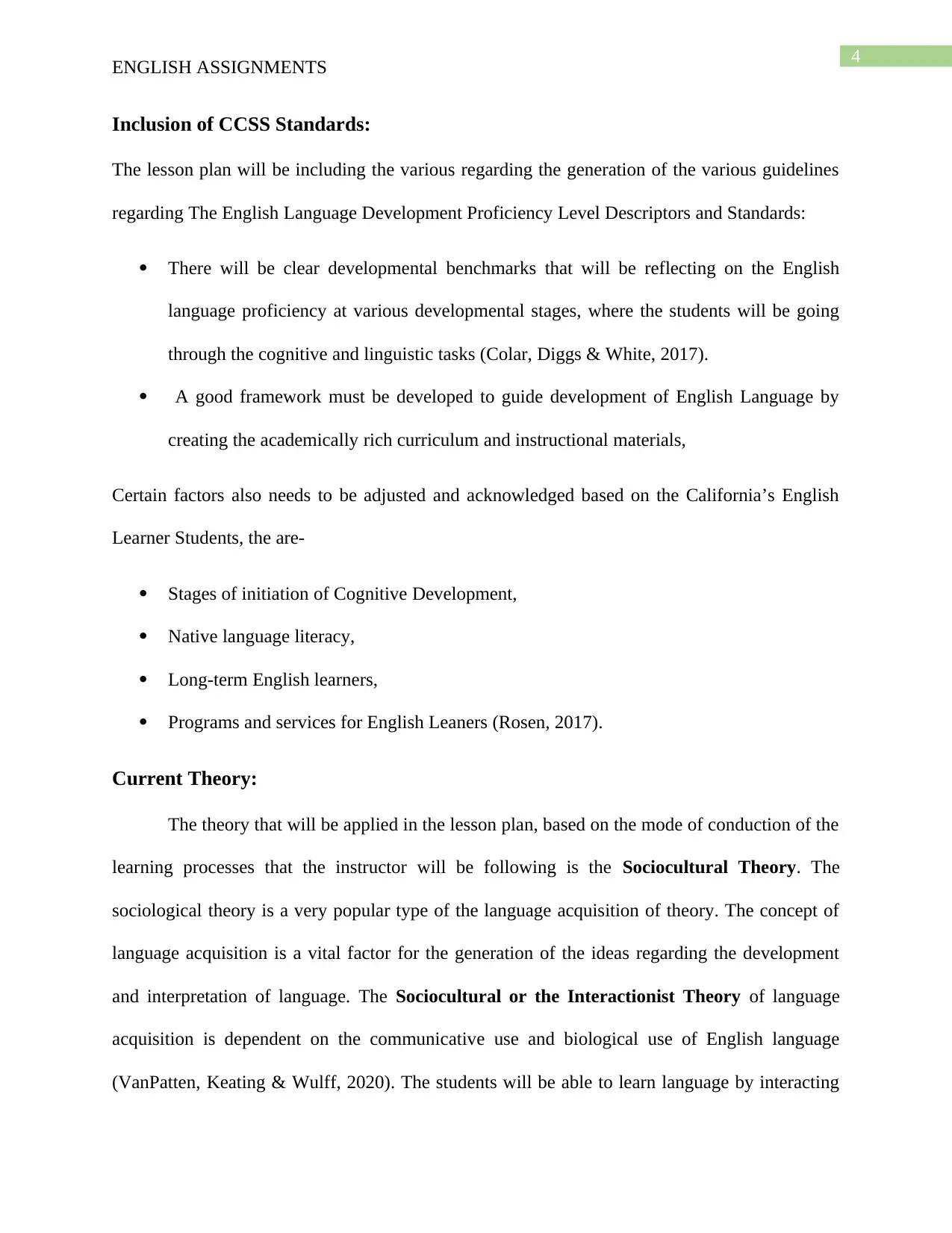
4
ENGLISH ASSIGNMENTS
Inclusion of CCSS Standards:
The lesson plan will be including the various regarding the generation of the various guidelines
regarding The English Language Development Proficiency Level Descriptors and Standards:
There will be clear developmental benchmarks that will be reflecting on the English
language proficiency at various developmental stages, where the students will be going
through the cognitive and linguistic tasks (Colar, Diggs & White, 2017).
A good framework must be developed to guide development of English Language by
creating the academically rich curriculum and instructional materials,
Certain factors also needs to be adjusted and acknowledged based on the California’s English
Learner Students, the are-
Stages of initiation of Cognitive Development,
Native language literacy,
Long-term English learners,
Programs and services for English Leaners (Rosen, 2017).
Current Theory:
The theory that will be applied in the lesson plan, based on the mode of conduction of the
learning processes that the instructor will be following is the Sociocultural Theory. The
sociological theory is a very popular type of the language acquisition of theory. The concept of
language acquisition is a vital factor for the generation of the ideas regarding the development
and interpretation of language. The Sociocultural or the Interactionist Theory of language
acquisition is dependent on the communicative use and biological use of English language
(VanPatten, Keating & Wulff, 2020). The students will be able to learn language by interacting
ENGLISH ASSIGNMENTS
Inclusion of CCSS Standards:
The lesson plan will be including the various regarding the generation of the various guidelines
regarding The English Language Development Proficiency Level Descriptors and Standards:
There will be clear developmental benchmarks that will be reflecting on the English
language proficiency at various developmental stages, where the students will be going
through the cognitive and linguistic tasks (Colar, Diggs & White, 2017).
A good framework must be developed to guide development of English Language by
creating the academically rich curriculum and instructional materials,
Certain factors also needs to be adjusted and acknowledged based on the California’s English
Learner Students, the are-
Stages of initiation of Cognitive Development,
Native language literacy,
Long-term English learners,
Programs and services for English Leaners (Rosen, 2017).
Current Theory:
The theory that will be applied in the lesson plan, based on the mode of conduction of the
learning processes that the instructor will be following is the Sociocultural Theory. The
sociological theory is a very popular type of the language acquisition of theory. The concept of
language acquisition is a vital factor for the generation of the ideas regarding the development
and interpretation of language. The Sociocultural or the Interactionist Theory of language
acquisition is dependent on the communicative use and biological use of English language
(VanPatten, Keating & Wulff, 2020). The students will be able to learn language by interacting
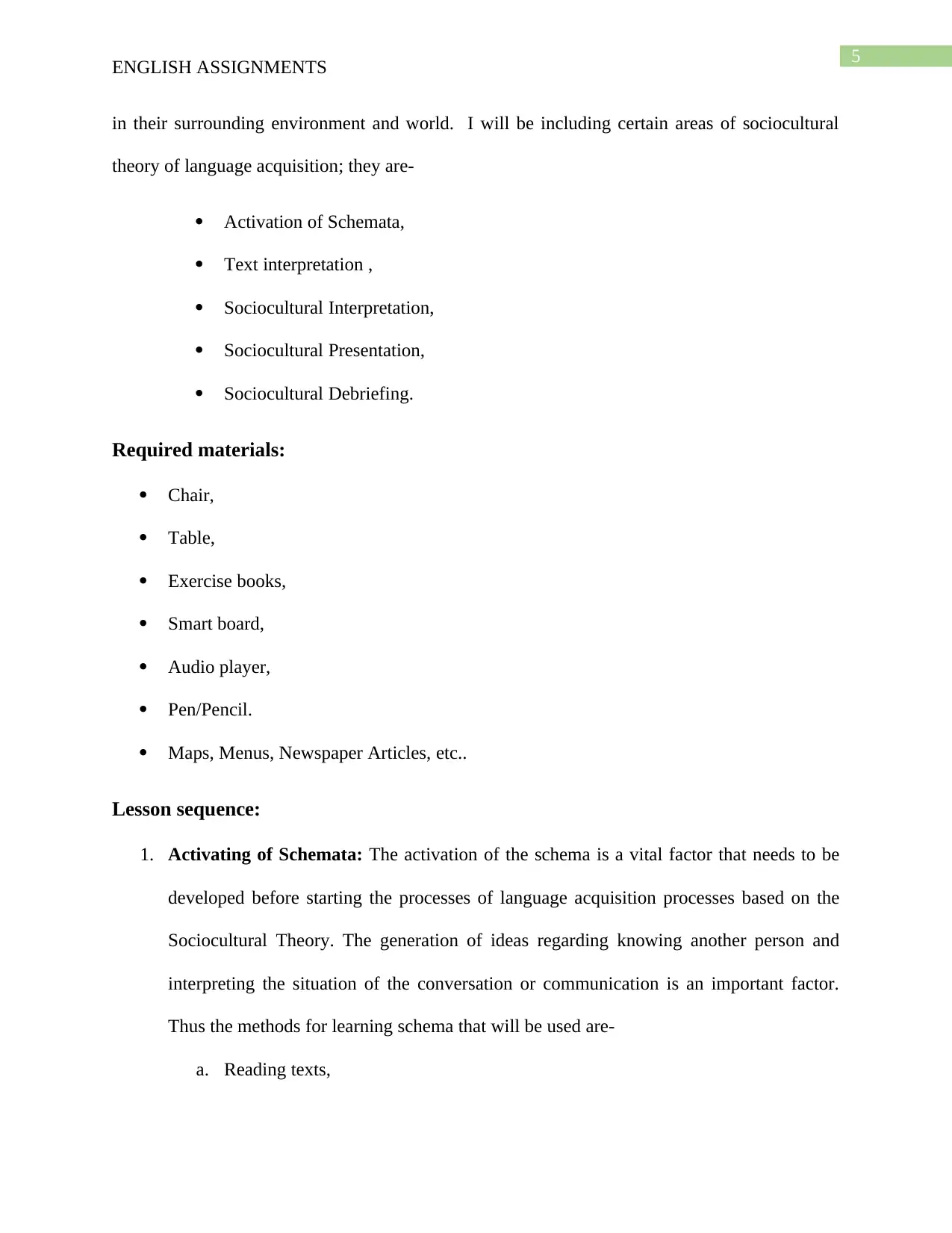
5
ENGLISH ASSIGNMENTS
in their surrounding environment and world. I will be including certain areas of sociocultural
theory of language acquisition; they are-
Activation of Schemata,
Text interpretation ,
Sociocultural Interpretation,
Sociocultural Presentation,
Sociocultural Debriefing.
Required materials:
Chair,
Table,
Exercise books,
Smart board,
Audio player,
Pen/Pencil.
Maps, Menus, Newspaper Articles, etc..
Lesson sequence:
1. Activating of Schemata: The activation of the schema is a vital factor that needs to be
developed before starting the processes of language acquisition processes based on the
Sociocultural Theory. The generation of ideas regarding knowing another person and
interpreting the situation of the conversation or communication is an important factor.
Thus the methods for learning schema that will be used are-
a. Reading texts,
ENGLISH ASSIGNMENTS
in their surrounding environment and world. I will be including certain areas of sociocultural
theory of language acquisition; they are-
Activation of Schemata,
Text interpretation ,
Sociocultural Interpretation,
Sociocultural Presentation,
Sociocultural Debriefing.
Required materials:
Chair,
Table,
Exercise books,
Smart board,
Audio player,
Pen/Pencil.
Maps, Menus, Newspaper Articles, etc..
Lesson sequence:
1. Activating of Schemata: The activation of the schema is a vital factor that needs to be
developed before starting the processes of language acquisition processes based on the
Sociocultural Theory. The generation of ideas regarding knowing another person and
interpreting the situation of the conversation or communication is an important factor.
Thus the methods for learning schema that will be used are-
a. Reading texts,
⊘ This is a preview!⊘
Do you want full access?
Subscribe today to unlock all pages.

Trusted by 1+ million students worldwide
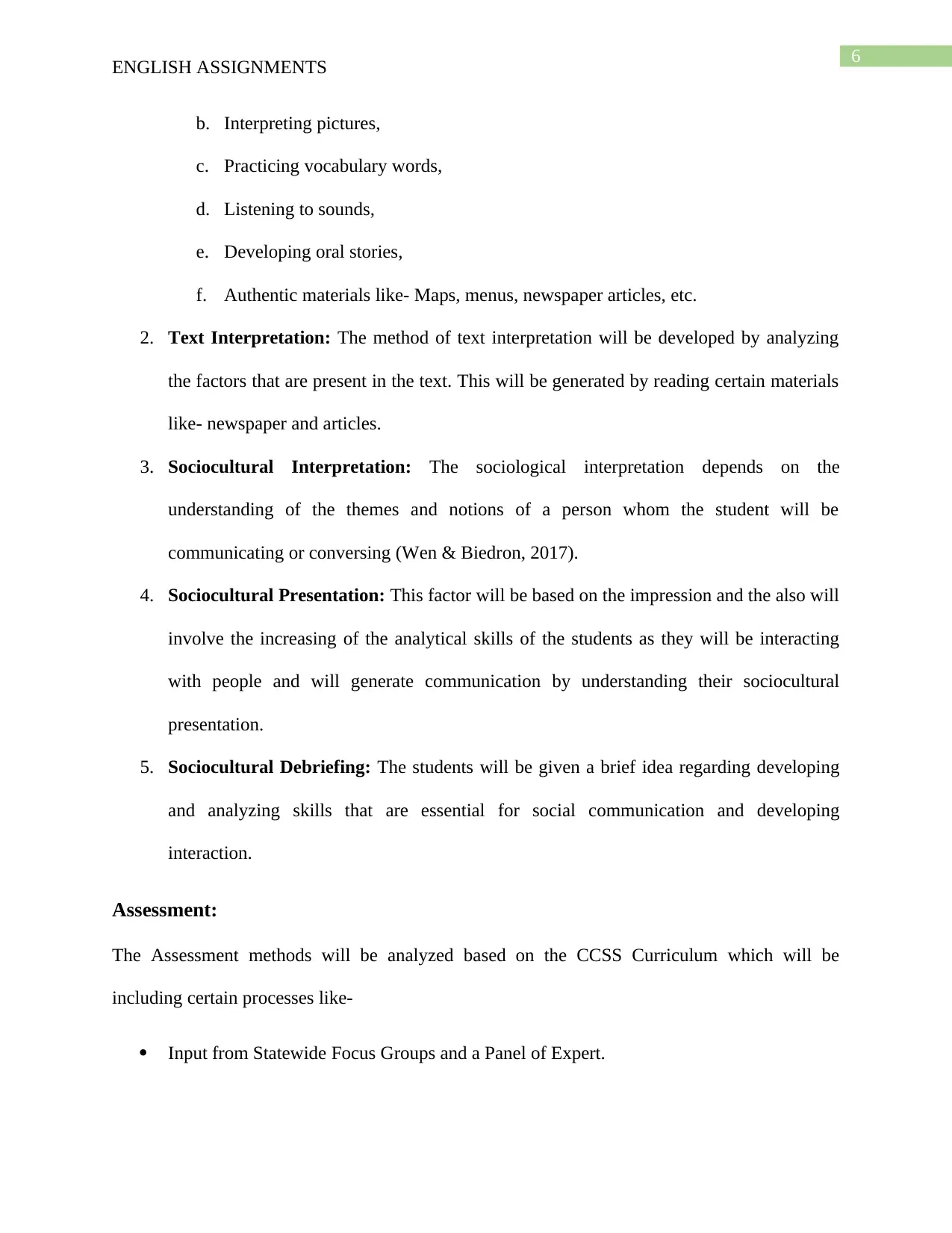
6
ENGLISH ASSIGNMENTS
b. Interpreting pictures,
c. Practicing vocabulary words,
d. Listening to sounds,
e. Developing oral stories,
f. Authentic materials like- Maps, menus, newspaper articles, etc.
2. Text Interpretation: The method of text interpretation will be developed by analyzing
the factors that are present in the text. This will be generated by reading certain materials
like- newspaper and articles.
3. Sociocultural Interpretation: The sociological interpretation depends on the
understanding of the themes and notions of a person whom the student will be
communicating or conversing (Wen & Biedron, 2017).
4. Sociocultural Presentation: This factor will be based on the impression and the also will
involve the increasing of the analytical skills of the students as they will be interacting
with people and will generate communication by understanding their sociocultural
presentation.
5. Sociocultural Debriefing: The students will be given a brief idea regarding developing
and analyzing skills that are essential for social communication and developing
interaction.
Assessment:
The Assessment methods will be analyzed based on the CCSS Curriculum which will be
including certain processes like-
Input from Statewide Focus Groups and a Panel of Expert.
ENGLISH ASSIGNMENTS
b. Interpreting pictures,
c. Practicing vocabulary words,
d. Listening to sounds,
e. Developing oral stories,
f. Authentic materials like- Maps, menus, newspaper articles, etc.
2. Text Interpretation: The method of text interpretation will be developed by analyzing
the factors that are present in the text. This will be generated by reading certain materials
like- newspaper and articles.
3. Sociocultural Interpretation: The sociological interpretation depends on the
understanding of the themes and notions of a person whom the student will be
communicating or conversing (Wen & Biedron, 2017).
4. Sociocultural Presentation: This factor will be based on the impression and the also will
involve the increasing of the analytical skills of the students as they will be interacting
with people and will generate communication by understanding their sociocultural
presentation.
5. Sociocultural Debriefing: The students will be given a brief idea regarding developing
and analyzing skills that are essential for social communication and developing
interaction.
Assessment:
The Assessment methods will be analyzed based on the CCSS Curriculum which will be
including certain processes like-
Input from Statewide Focus Groups and a Panel of Expert.
Paraphrase This Document
Need a fresh take? Get an instant paraphrase of this document with our AI Paraphraser
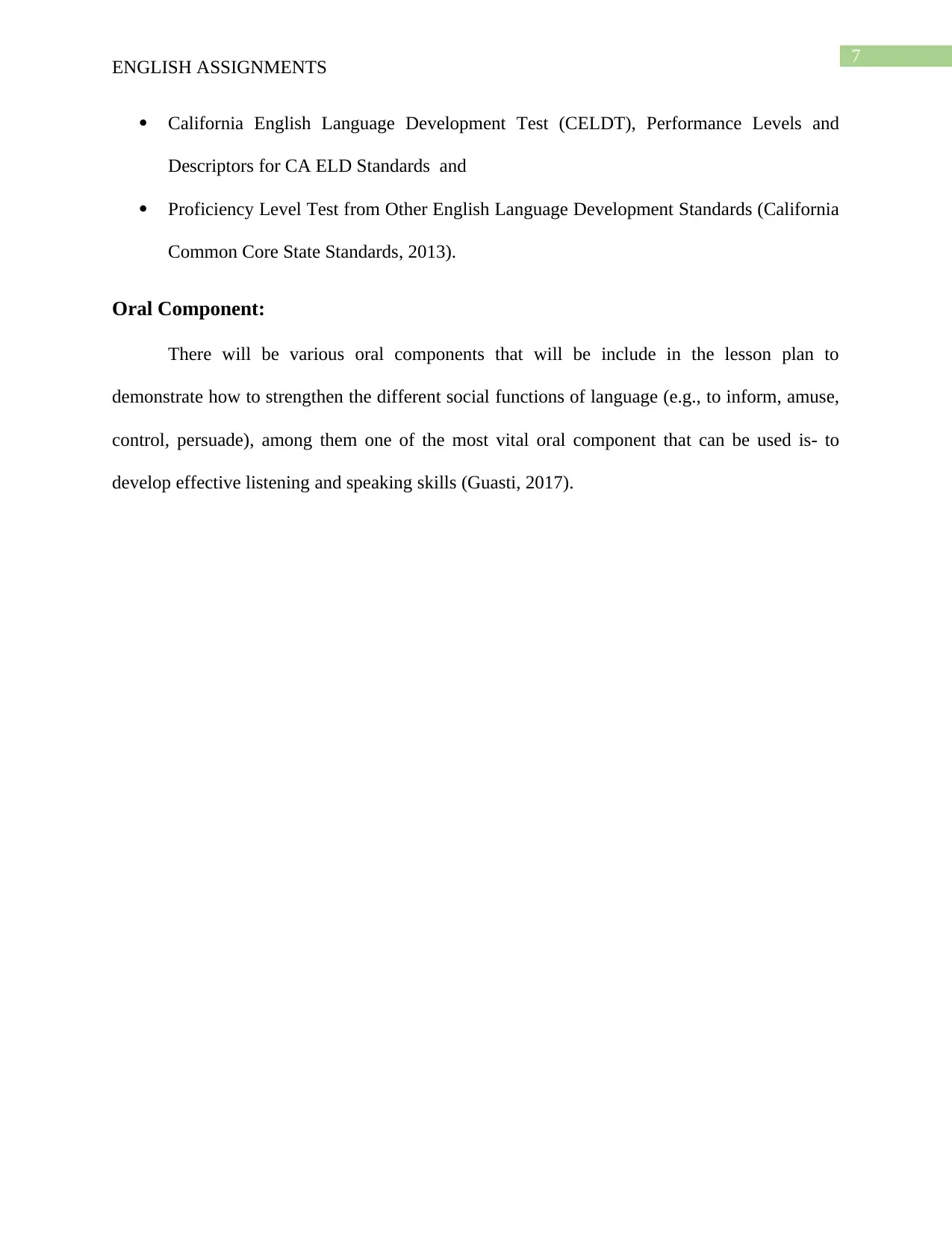
7
ENGLISH ASSIGNMENTS
California English Language Development Test (CELDT), Performance Levels and
Descriptors for CA ELD Standards and
Proficiency Level Test from Other English Language Development Standards (California
Common Core State Standards, 2013).
Oral Component:
There will be various oral components that will be include in the lesson plan to
demonstrate how to strengthen the different social functions of language (e.g., to inform, amuse,
control, persuade), among them one of the most vital oral component that can be used is- to
develop effective listening and speaking skills (Guasti, 2017).
ENGLISH ASSIGNMENTS
California English Language Development Test (CELDT), Performance Levels and
Descriptors for CA ELD Standards and
Proficiency Level Test from Other English Language Development Standards (California
Common Core State Standards, 2013).
Oral Component:
There will be various oral components that will be include in the lesson plan to
demonstrate how to strengthen the different social functions of language (e.g., to inform, amuse,
control, persuade), among them one of the most vital oral component that can be used is- to
develop effective listening and speaking skills (Guasti, 2017).
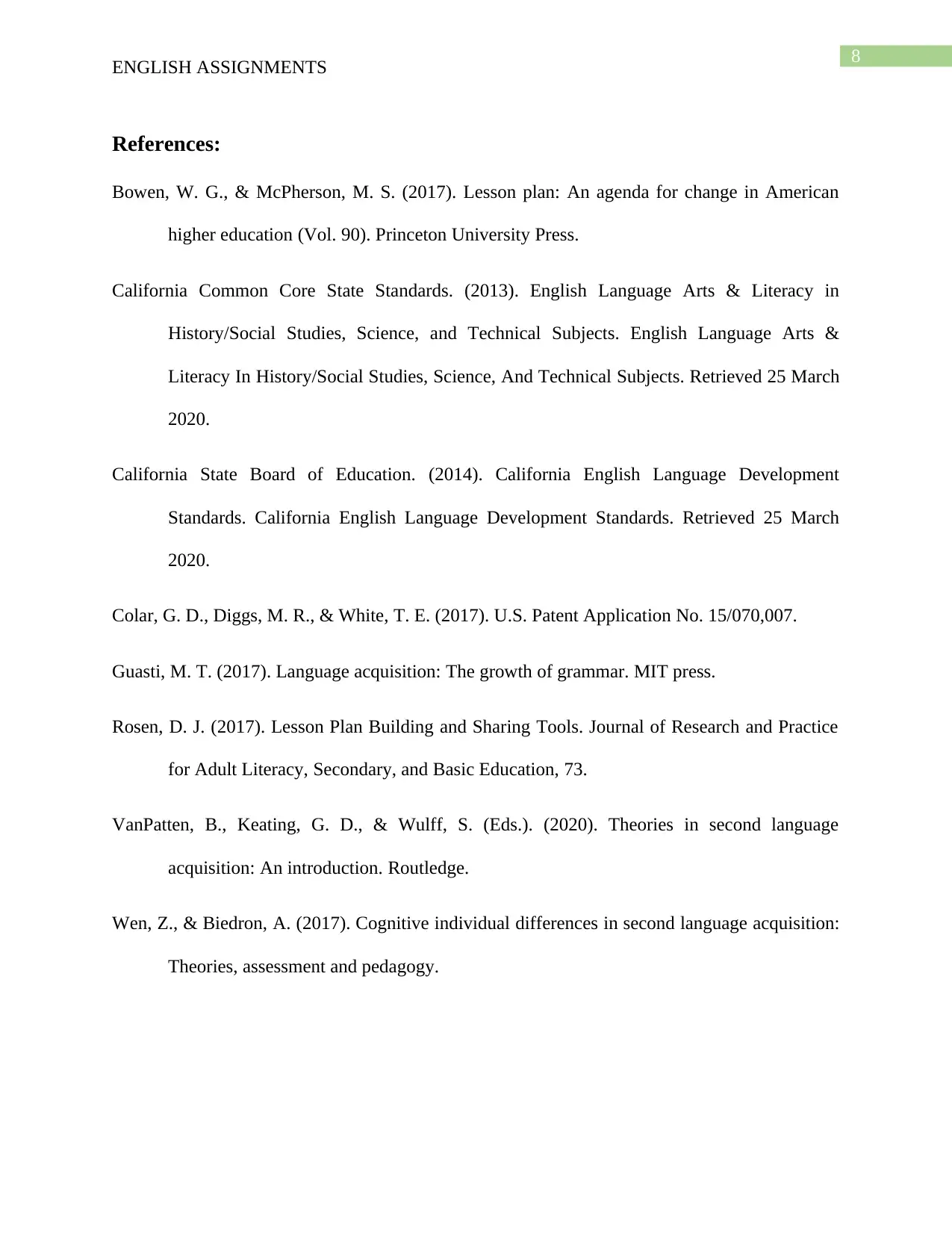
8
ENGLISH ASSIGNMENTS
References:
Bowen, W. G., & McPherson, M. S. (2017). Lesson plan: An agenda for change in American
higher education (Vol. 90). Princeton University Press.
California Common Core State Standards. (2013). English Language Arts & Literacy in
History/Social Studies, Science, and Technical Subjects. English Language Arts &
Literacy In History/Social Studies, Science, And Technical Subjects. Retrieved 25 March
2020.
California State Board of Education. (2014). California English Language Development
Standards. California English Language Development Standards. Retrieved 25 March
2020.
Colar, G. D., Diggs, M. R., & White, T. E. (2017). U.S. Patent Application No. 15/070,007.
Guasti, M. T. (2017). Language acquisition: The growth of grammar. MIT press.
Rosen, D. J. (2017). Lesson Plan Building and Sharing Tools. Journal of Research and Practice
for Adult Literacy, Secondary, and Basic Education, 73.
VanPatten, B., Keating, G. D., & Wulff, S. (Eds.). (2020). Theories in second language
acquisition: An introduction. Routledge.
Wen, Z., & Biedron, A. (2017). Cognitive individual differences in second language acquisition:
Theories, assessment and pedagogy.
ENGLISH ASSIGNMENTS
References:
Bowen, W. G., & McPherson, M. S. (2017). Lesson plan: An agenda for change in American
higher education (Vol. 90). Princeton University Press.
California Common Core State Standards. (2013). English Language Arts & Literacy in
History/Social Studies, Science, and Technical Subjects. English Language Arts &
Literacy In History/Social Studies, Science, And Technical Subjects. Retrieved 25 March
2020.
California State Board of Education. (2014). California English Language Development
Standards. California English Language Development Standards. Retrieved 25 March
2020.
Colar, G. D., Diggs, M. R., & White, T. E. (2017). U.S. Patent Application No. 15/070,007.
Guasti, M. T. (2017). Language acquisition: The growth of grammar. MIT press.
Rosen, D. J. (2017). Lesson Plan Building and Sharing Tools. Journal of Research and Practice
for Adult Literacy, Secondary, and Basic Education, 73.
VanPatten, B., Keating, G. D., & Wulff, S. (Eds.). (2020). Theories in second language
acquisition: An introduction. Routledge.
Wen, Z., & Biedron, A. (2017). Cognitive individual differences in second language acquisition:
Theories, assessment and pedagogy.
⊘ This is a preview!⊘
Do you want full access?
Subscribe today to unlock all pages.

Trusted by 1+ million students worldwide
1 out of 9
Related Documents
Your All-in-One AI-Powered Toolkit for Academic Success.
+13062052269
info@desklib.com
Available 24*7 on WhatsApp / Email
![[object Object]](/_next/static/media/star-bottom.7253800d.svg)
Unlock your academic potential
Copyright © 2020–2026 A2Z Services. All Rights Reserved. Developed and managed by ZUCOL.





